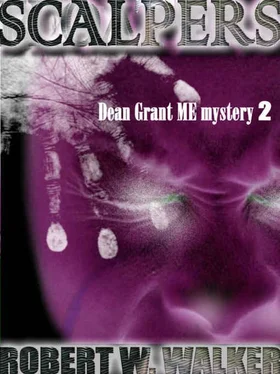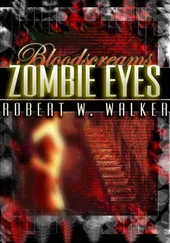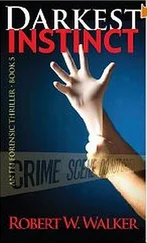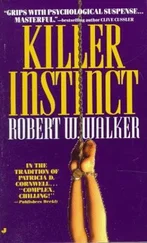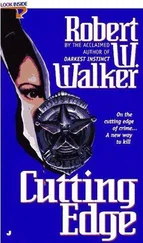"Going to dinner?” asked Dean.
"I was planning a quiet meal at home ... but if you'd like to talk, sure, Dr. Grant."
"A quiet meal at home sounds nice. Do you wish to call your wife?"
"I have none. I'm alone."
"And you like your own cooking? That's good."
Hamel nodded. “What is it you'd like to talk about, Doctor?"
"I'd like your impression of the killers, and how you deduced the possibility of two men long before we did."
"All right."
"And I'd like to have your professional opinion on a policeman here."
"Park or Dyer, or both?"
"Park in particular."
"Interesting choice."
"Oh, why do you say so?"
"Man's a manic-depressive, with mood swings wider than a ball on a tether, the obvious choice. Dyer, on the other hand, is steady. Psychiatry is rather a simple science if one uses the God-given powers of observation we all have, don't you agree?"
"Sometimes that's the case, yes."
"But there are those who mask their perversions more ... successfully, you mean? Yes, that is also sometimes the case. But by and large, most human beings don't have the strength of will to carry it off. Most of us display our deficiencies in our relationships, either at work or at home."
"You won't mind discussing Park with me, then?"
"Chief Hodges has informed me you're on the case, and so, Dr. Grant, you have a right to know who your case partners are. Privileged information between a public servant carrying a gun and his psychiatrist is not so privileged as in the private sector. It's one reason we police “shrinks,” as we're called, are quite unpopular. However, Officer Park's been granted special concidera—"
At that moment Peggy Carson was coming toward them and Dean saw something flash in her eyes. On seeing Hamel, she immediately looked for an avenue of escape, but there was none.
"Well, the wayward Officer Carson,” said Dr. Hamel. “You, my dear girl, have been doubly negligent today—first skipping out on the hospital, and now missing our session. I see that promptness is not your strong suit, Officer. Tomorrow morning, nine sharp."
Peggy said a perfunctory hello to Dean, keeping it brief and professional, and then replied to Dr. Hamel “I don't see how wasting my time with you, Dr. Hamel, is going to serve the public or myself one bit, and if you please, read this, and no thank you, I will not see you tomorrow at nine. Good evening."
Peggy pushed an envelope into Hamel's hands, and turned abruptly, and disappeared the way she came.
"Peggy, Officer Carson, has been dodging me. We have some sessions together, the first of which has just come to an end without her,” the thin Dr. Hamel told Dean. The man's cheekbones, high to begin with, seemed enlarged now with a controlled rage toward Peggy Carson. Dean had seen it before, one part of a police department trying to do its job, at war with a second part. Often it boiled away to personality conflicts.
"Nobody relishes being cross-examined, especially by people tending to disbelieve them,” said Dean in Peggy's defense.
Dr. Hamel stared at Dean, studying him closely for the first time. “You don't seriously believe the second killer is a ... a dwarf?"
"We're onto evidence that could quite well corroborate the fact, Dr. Hamel."
Hamel gave Dean an enigmatic smile. “You do intend to live up to your reputation for the bizarre, Dr. Grant."
"It's not my reputation I'm concerned with."
"Of course, of course ... You realize, doctor, my concern for Officer Carson must include assessing the safety of people she will come into contact with daily. The department can't afford to have even the appearance of an hysterical woman on the street with a revolver in her hands, now can it?"
"Quite frankly, sir. I've never met a more level-headed police officer, male or female."
Dean and Dr. Hamel resumed their conversation over dinner at a nearby cafe-style restaurant which, while small, looked out over a busy downtown street from a second-floor perch.
"So, what sort of man goes about terrorizing people with a scalpel, taking scalps, with the help of a dwarf?” Dean inquired, interested in how Dr. Hamel would answer the question.
"A Wild West showman out of a job?” joked the tall, angular Hamel, who might himself have been a stand-in for Henry Fonda in My Darling Clementine. “Or a man who is fixing on hair, the scalp in particular, and in this fixation lies his motive. Here we probably have a man who has a nine-to-five job, either blue- or white-collar—a computer programmer, clerk, or plumber—but by night must feed an insatiable need for bloodshed of a most specific nature, bloodshed that involves the taking of another man's head."
"Head? By head you mean scalp."
"One and the same thing among barbaric peoples, you know. The scalp represents the human mind and spirit to the scalper. It embodies his spirit and all the energies of his being."
"What does he do with the scalps?"
"Who knows ... sleeps with them, stuffs mattresses with them, decorates his walls with them. It may even be assumed that he derives sexual gratification from them, and for all I know, he—or they—might very well ingest them."
"Eat hair?"
"If it brought you strength and power over others, wouldn't you?"
"These men believe that? Is that like a religion with some people, like maybe Hare Kirshna?"
"Not to my knowledge, no. But we're dealing with sick minds here. Minds that live for scalp raising."
"But this is all speculation, isn't it, Dr. Hamel?"
Hamel bit his lip, plunking down his wineglass and saying, “You've caught me, yes. I speculate a great deal on such crimes, as I know you must. It's part of my job. But like you, it is speculation based on an educated guess, educated by the killer himself."
"We're not so different then, you and I."
Hamel considered this. “No, but I don't cut up dead people, Dr. Grant, although I sometimes mentally slice open a dead man to understand the workings of his mind."
"You theorized early on that there could be two men doing the scalping. How did you arrive at that conclusion with so little evidence to go on?"
"Quite simple, really. If we look back at the multitude of such cruel serial murders, they often involve two persons or more. Your very celebrated Floater case in Chicago points at an entire family's involvement, and the killer herself was actually living out two personalities, correct? Angel Rae, the girl, and Brother Timothy, was it? Now, if you read as much as I do in the literature, it wouldn't take much to speculate that the Scalper is acting out some form of wish fulfillment and that his hand is directed by a domineering, powerful force, very likely a second killer, who has him mesmerized into doing what he's told.
"But most of all, I base it on the telephone calls we've been receiving. The murderers—one of them, at least—have called us, more or less owning up to everything. "
Dean was speechless.
"And although it's hard for me to tell you this, well, we've had a tip-off. It concerns Corman and the forensic mistakes he's made."
Dean stared for a solid minute at Hamel, unbelieving. “Is this general knowledge? Do Park and Dyer know about this? Hodges?"
"Of course they do."
"Corman didn't say a word."
"Sid was never informed, Dr. Grant."
"You people don't need my help, you need an efficiency expert. One hand doesn't know what the other's doing."
"What did you expect of us once we began to suspect Corman of malfeseance?"
"You can't really suspect him of these hideous crimes!'
"Perhaps not, but he may be covering for someone else. It certainly points in his direction."
Dean bit his lower lip and shook his head thoughtfully. “Tell me all you can about this voice over the phone."
Читать дальше
